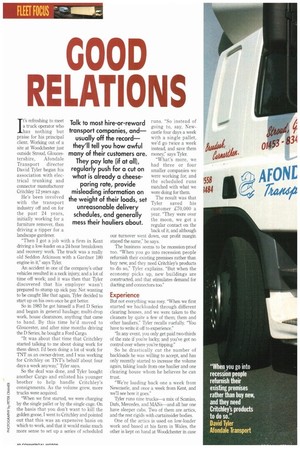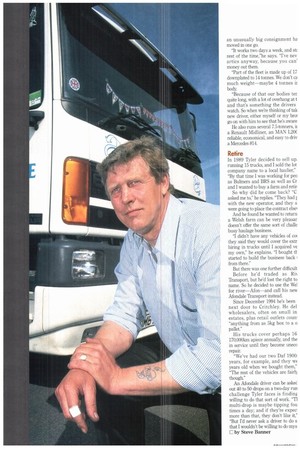GOOD LATIONS
Page 42

Page 43

If you've noticed an error in this article please click here to report it so we can fix it.
It's refreshing to meet a truck operator who has nothing but praise for his principal client. Working out of a site at Woodchester just outside Stroud, Glouces
tershire, Afondale Transport director David Tyler began his association with electrical trunking and connector manufacturer Critchley 12 years ago.
He's been involved with the transport industry off and on for the past 24 years, initially working for a furniture remover, then driving a tipper for a landscape gardener.
"Then I got a job with a firm in Kent driving a low-loader on a 24-hour breakdown and recovery work, The truck was a really old Seddon Atkinson with a Gardner 180 engine in it," says Tyler.
An accident in one of the company's other vehicles resulted in a neck injury, and a lot of time off work; and it was then that Tyler discovered that his employer wasn't prepared to stump up sick pay. Not wanting to be caught like that again. Tyler decided to start up on his own once he got better.
So in 1983 he got himself a Ford D Series and began in general haulage; multi-drop work, house clearances, anything that came to hand. By this time he'd moved to Gloucester, and after nine months driving the D Series, he bought a Ford Cargo.
"It was about that time that Critchley started talking to me about doing work for them direct. I'd been doing a lot of work for TNT as an owner-driver, and I was working for Critchley on TNT's behalf about four days a week anyway," Tyler says.
So the deal was done, and Tyler bought another Cargo and enlisted his younger brother to help handle Critchley's consignments. As the volume grew, more trucks were acquired.
"When we first started, we were charging by the single pallet or by the single cage. On the basis that you don't want to kill the golden goose, I went to Critchley and pointed out that this was an expensive basis on which to work, and that it would make much more sense to set up a series of scheduled runs. "So instead of going to, say, Newcastle four days a week with a single pallet, we'd go twice a week instead, and save them money," says Tyler.
"What's more, we had three or four smaller companies we were working for, and The result was that Tyler saved his customer 00,000 a year. "They were over the moon, we got a regular contact on the back of it, and although our turnover went down, our profit margin stayed the same." he says.
The business seems to be recession-proof too. "When you go into recession people refurnish their existing premises rather than buy new, and they need Critchley's products to do so," Tyler explains. "But when the economy picks up, new buildings are constructed, and that stimulates demand for ducting and connectors too."
Experience
But not everything was rosy. "When we first started we back loaded through different clearing houses, and we were taken to the cleaners by quite a few of them; them and other hauliers," Tyler recalls ruefully. "You have to write it off to experience."
"In any event, you only get paid two-thirds of the rate if you're lucky, and you've got no control over where you're tipping."
So he drastically cut the number of backloads he was willing to accept, and has only recently started to increase the volume again, taking loads from one haulier and one clearing house whom he believes he can trust.
"We're loading back one a week from Newcastle, and once a week from Kent, and we'll see how it goes."
Tyler runs nine trucks—a mix of Scanias, Dafs, Mercedes, and MANs—and all bar one have sleeper cabs. Two of them are artics, and the rest rigids with curtainsider bodies.
One of the artics is used on low-loader work and based at his farm in Wales, the other is kept on hand at Woodchester in case an unusually big consignment ha moved in one go.
"It works two days a week, and stz rest of the time,"he says. "I've nev artics anyway, because you can' money out them.
"Part of the fleet is made up of 17 downplated to 14 tonnes. We don't ca much weight—maybe 4 tonnes it body
"Because of that our bodies ter quite long, with a lot of overhang at t and that's something the drivers watch. So when we're thinking of tak new driver, either myself or my bpi go on with him to see that he's aware
He also runs several 7.5-tonners, it a Renault Midliner, an MAN L20( reliable, economical, and easy to driv a Mercedes 814.
In 1989 Tyler decided to sell up. running 15 trucks, and I sold the lot company name to a local haulier," "By that time I was working for pea as Bulmers and BRS as well as Cr and I wanted to buy a farm and retir So why did he come back? "C asked me to," he replies. "They had with the new operator, and they s were going to place the contract elsei And he found he wanted to return a Welsh farm can be very pleasar doesn't offer the same sort of challe busy haulage business.
"I didn't have any vehicles of coi they said they would cover the extr hiring in trucks until I acquired ve my own," he explains. "I bought if started to build the business back 1 from there."
But there was one further difficult Before he'd traded as Transport, but he'd lost the right to name. So he decided to use the Wel for river—Afon—and call his new Afondale Transport instead.
Since December 1994 he's been next door to Critchley. He del wholesalers, often on small in estates, plus retail outlets count "anything from as 5kg box to a o pallet."
His trucks cover perhaps 16 170,000Icm apiece annually, and the in service until they become uneco repair.
"We've had our two Daf 1900! years, for example, and they w( years old when we bought them," "The rest of the vehicles are fair15 though."
An Afondale driver can be askec out 40 to 50 drops on a two-day run challenge Tyler faces is finding willing to do that sort of work. "T1 multi-drop is maybe tipping fou times a day; and if they're expec. more than that, they don't like it," "But I'd never ask a driver to do s that I wouldn't be willing to do mys E by Steve Banner
















































































































